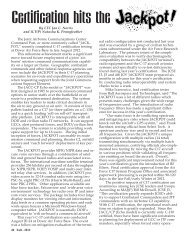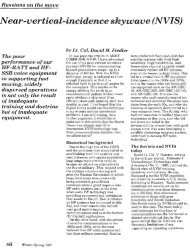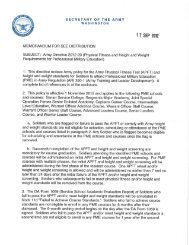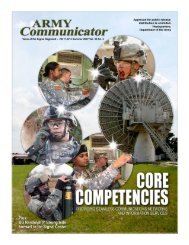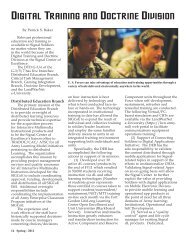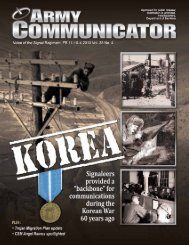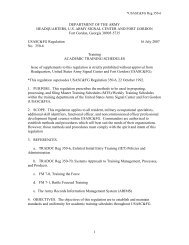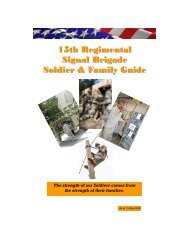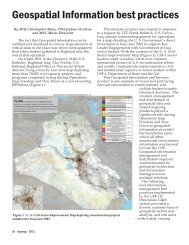AC Summer 08 WIN-T Online - United States Army Signal Center of ...
AC Summer 08 WIN-T Online - United States Army Signal Center of ...
AC Summer 08 WIN-T Online - United States Army Signal Center of ...
Create successful ePaper yourself
Turn your PDF publications into a flip-book with our unique Google optimized e-Paper software.
IGFC M6 visiting Baghdad <strong>Signal</strong> University.<br />
without a brigade headquarters.<br />
It is safe to say these individuals<br />
do not clearly understand the<br />
benefits a signal brigade brings to<br />
the fight. The two ESBs in Iraq are<br />
currently providing JNTC teams to<br />
three divisions, the Marine Expeditionary<br />
Force, and several corps<br />
separate brigades. The corps assigns<br />
these teams in different proportions<br />
from complete companies to individual<br />
CPN teams. Often these<br />
teams are assigned for temporary<br />
missions that last only a few months.<br />
After the mission is complete, the<br />
team returns, its personnel and<br />
equipment are reset, and it is prepared<br />
for a new mission. At any<br />
given time, Task Force Thunderbird<br />
has multiple teams traveling to new<br />
locations, returning from completed<br />
missions, and others training in<br />
preparation <strong>of</strong> future requirements.<br />
A TTSB is designed to battle command<br />
multiple ESBs and complete<br />
these personnel, logistics, and<br />
operational readiness related<br />
missions; the corps G6 is not. While<br />
the corps G6 is focused on corps /<br />
division level operations, the <strong>Signal</strong><br />
brigade staff is focused on asset<br />
management and operational<br />
readiness <strong>of</strong> ESBs. ESBs benefit from<br />
the processes, staff expertise, and<br />
technical support provided by the<br />
TTSB that can only be acquired by<br />
continuous training and readiness<br />
oversight.<br />
Part <strong>of</strong> the technical expertise<br />
Task Force Thunderbird brought to<br />
Iraq was network optimization. The<br />
Task Force Thunderbird engineering<br />
section led the CNOSC’s efforts to<br />
improve an already mature network.<br />
Quickly identifying an opportunity<br />
to decrease the power needed for<br />
satellite terminals, the Task Force<br />
installed the larger 16’ Lightweight<br />
High-Gain X-band Antenna. The<br />
immediate impact was a reduced<br />
strain on the tactical signal network.<br />
Another network optimization effort<br />
included removing all older AN-<br />
TRC 190 radio systems, which<br />
possessed only 2 MB <strong>of</strong> throughput,<br />
from the corps tactical network and<br />
replacing them with newer versions<br />
with four times the throughput. In<br />
some cases, the CNOSC helped<br />
identify locations that would benefit<br />
from the receipt <strong>of</strong> an even more<br />
capable 16 MB radio system. They<br />
identified locations that were near<br />
bandwidth saturation and developed<br />
multiple solutions to alleviate<br />
network congestion. The CNOSC<br />
engineering section also championed<br />
the use <strong>of</strong> Quality <strong>of</strong> Service statements<br />
for high priority services,<br />
ensuring mission critical information<br />
arrived at its destination above all<br />
other traffic. These successful<br />
network optimization efforts were<br />
the result <strong>of</strong> close coordination<br />
between the CNOSC engineering<br />
section and the various division<br />
engineering sections. This coordination<br />
has led to increased communications<br />
capabilities and a much<br />
better understanding <strong>of</strong> the tactical<br />
58 <strong>Summer</strong> 20<strong>08</strong><br />
network and processes necessary to<br />
develop future engineering solutions.<br />
One additional skill set that the<br />
TTSB brings to the corps fight is<br />
specialized signal training. Task<br />
Force Thunderbird re-established the<br />
Baghdad <strong>Signal</strong> University, which<br />
had been set up and run by the<br />
previous Corps <strong>Signal</strong> Brigades<br />
during their rotations. BSU provides<br />
all US and Coalition Military, as well<br />
as DoD Civilians in theater, an<br />
opportunity to receive training on<br />
Basic and Advanced Networking,<br />
and Fiber Optic Installation. At the<br />
request <strong>of</strong> the corps and division<br />
G6s, Task Force Thunderbird added<br />
Very Small Aperture Terminal<br />
training to the curriculum and will<br />
also start training antenna installation<br />
and safety. These two courses<br />
represent the continuous dialog<br />
between all signal organizations and<br />
a successful effort to remain current<br />
in tactical communications. Task<br />
Force Thunderbird worked closely<br />
with the Iraqi Ground Forces Command<br />
G6, MAJ Debbie Bowker, and<br />
developed training for the Iraqi<br />
Ground Forces Command Soldiers.<br />
Courses were translated into Arabic<br />
and BSU developed an aggressive<br />
program <strong>of</strong> study that matched the<br />
abilities <strong>of</strong> the IGFC Soldiers. MAJ<br />
Bowker <strong>of</strong> the IGFC said “TF<br />
Thunderbird’s Baghdad <strong>Signal</strong><br />
University, has developed a strategic<br />
partnership with the Iraqi Ground



